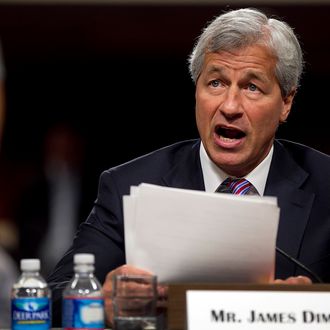
There is probably a German word that could adequately describe the magnitude of our ambivalence when it comes to Congressional bank hearings. When legislators decide to haul a big-bank CEO in front of a committee, the result is almost always a falsely contrite rich guy giving overlawyered non-answers to a grandstanding parade of fools who are less interested in inquiring about the matter at hand than making the cable news with quippy zingers. (Yes, despite what “Veep” has to say.)
Jamie Dimon’s testimony in front of the Senate banking committee today was no exception. That said, some people came out of the two-hour hearing looking better than others. Here’s the Dimonpalooza report card:
Jamie Dimon: B
The JPMorgan Chase CEO skated by, emerging relatively unscathed by a line of questioning that could have been much more personal and accusatory. He did all the requisite gnashing of teeth over the bank’s $2-billion-plus loss, calling his initial “tempest in a teapot” assessment “dead wrong,” and saying that the chief investment office’s trading strategy was “poorly conceived and vetted.” He also avoided revealing details about the London Whale’s trade that would have made it harder to unwind. And he dodged personal responsibility for the bank’s decision to change its risk-assessment model earlier this year to a faulty one, despite later telling CNBC that he was “copied on a memo” about the change. (Reading your e-mail is important, kids!)
Ina Drew: F
The person most stung by Dimon’s testimony, Ina Drew, wasn’t even in the room. Drew, JPMorgan’s deposed chief investment officer who presided over the bad trades, was summarily thrown under the bus by Dimon, who blamed her and fellow managers for not giving enough scrutiny to the synthetic credit portfolios that lost all the money. When Dimon was asked if he would claw back bonuses for any of JPMorgan’s executives, he said that the bank’s clawback policy was “extensive.” And though he didn’t name names, we’re pretty sure Drew was cringing in a mansion somewhere.
Senate Republicans: C
Look, Senate Republicans. We know you’re a little trapped. In an election year, it’s probably not a good idea to be seen criticizing a chief of industry and promoting government regulation in the financial sector, no matter how mad you are, or how much that regulation could help avoid $2 billion trading losses. But did you have to make it so obvious? Seriously, between Senator David Vitter’s denunciation of overregulation and Senator Richard Shelby’s detour into the losses sustained by Fannie Mae and Freddie Mac, the treatment given to Dimon by the committee’s right-wing delegation could have been mistaken for a tongue bath.
Jon Tester: A-
A special commendation to Senator Tester for forgetting about JPMorgan entirely, and delivering a stemwinder about how MF Global’s collapse had hurt farmers in Montana. That takes some bovine-sized balls.
Senate Democrats: C+
Democrats on the committee came out a little bit ahead, if only because Senator Kay Hagan and Senator Sherrod Brown stepped up with questions that resembled actual truth-seeking near the end. But it was hard to watch an elected official from the good state of Rhode Island (Democrat Jack Reed) struggle with the definition of a “hedge.” Dude, this hearing was all about hedging. Not the kind of performance that inspires confidence in our democracy.
Senator Bob Menendez: A
The Democrat from New Jersey gets a special commendation for livening up the hearing by asking Dimon, “You said the hedge morphed — what did it morph into? Russian Roulette?” and saying that JPMorgan’s “fortress balance sheet” had a “moat that was dug by taxpayers.” Our editor thanks you.
The Volcker Rule: B
Dimon called the Volcker Rule “unnecessary,” but his testimony will cause many lawmakers to wonder if the opposite is true. It’s not clear that a bright line between prop trading and portfolio hedging would have saved JPMorgan from the London Whale, but Dimon’s admission that a Volcker Rule “very well have stopped parts of what this portfolio morphed into” will be all the ammo the provision’s supporters need.
CodePink: D
You know how some gay people feel about Dan Savage? That, while generally sympathetic to Savage’s cause and nominally on the “same team,” they think his style and approach to activism make him a less-than-ideal candidate for the public face of the movement? Your guerrilla protests on the Senate floor make liberals feel the same way.
Regulators: B
Today could have been a disaster for regulators, especially the 60-odd members of the OCC who were stationed inside JPMorgan’s headquarters when the London Whale’s trades were going south. But Dimon carefully avoided blaming regulators for sitting on their hands, saying that they didn’t know about the CIO’s massive trades until after they were detailed in the media, and implying that there’s no way they could have.
Wall Street: B
Bank stocks, including JPMorgan’s, rose on the heels of Dimon’s testimony, as investors began to suspect that the worst is now over. We suspect they’re probably right, unless there is a mini-Whale floating out there somewhere.
Main Street: D
Main Street didn’t really do anything to deserve a D, but it gets one nonetheless. As CNBC’s John Carney pointed out on air, and ProPublica put in handy digest form, the Senate banking committee is hopelessly compromised when it comes to Wall Street, its members having accepted millions of dollars in campaign donations from the coffers of JPMorgan and other big banks. Which means that although today’s testimony may have looked like a face-off on camera, it was more like a gentle Q&A between friends.
Lloyd Blankfein: A
The real winner of today’s testimony, though, was Blankfein, whose charm offensive continued with a speech in Chicago today. Out of the spotlight for once, the Goldman Sachs CEO gave a leisurely talk about China and Europe, schmoozed with local business bigwigs, and joked that he was glad he wasn’t in Dimon’s spot. Looks like someone is angling for that newly vacant “Least-Hated Banker” title.





























